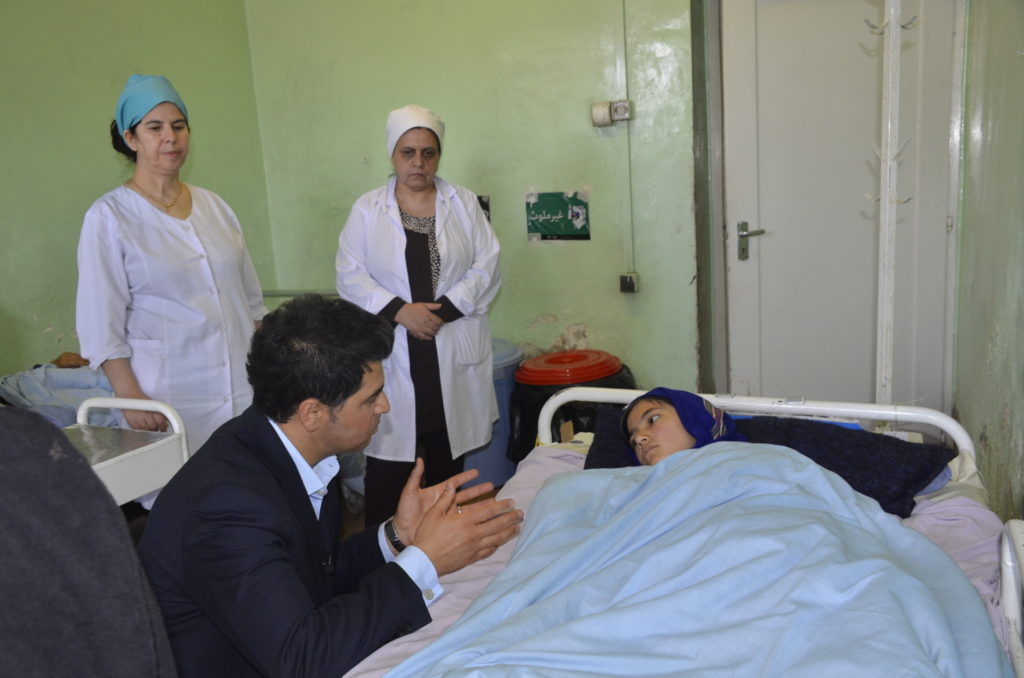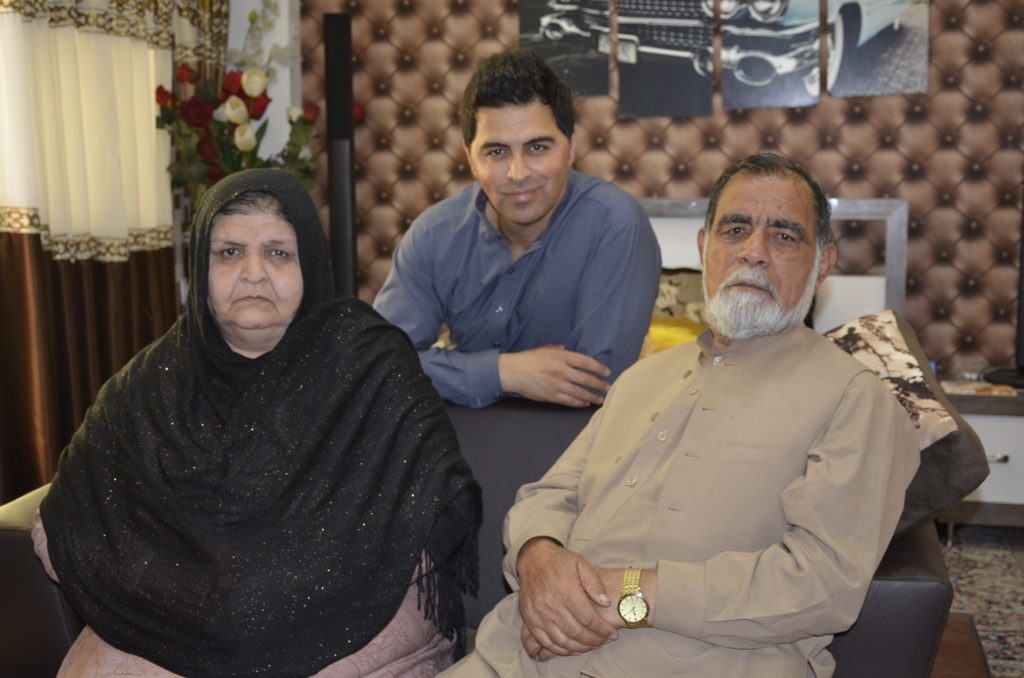Digital doctors
A Chester-based doctor from Afghanistan is helping save lives by linking up doctors in his home country and medical experts overseas through the concept of telemedicine
When Waheed Arian arrived at his Cambridge University interview in 2003, he was unable to do up his tie. Sitting on his own, surrounded by families huddled nervously around cue cards and revision notes, he was forced to ask another applicant’s parent to help.
Someone asked where his own parents were and he lied, saying that they were busy. The contrast between Arian and the other prospective students could not have been starker.
Arian’s long route to this point began in war-torn Afghanistan, where he was born.
“Most of our time was spent hiding in cellars from the rockets that were raining on us daily,” he remembers of his childhood in the capital, Kabul. “I don’t recall any moments of going out, to be able to play, to be able to enjoy life.”

Forced to flee from the plague of rockets, he spent three years in a Pakistani refugee camp at the age of five. The heat was sweltering, rising to 45 degrees centigrade, and little food or clean water made a dire situation even worse.
“My family members and I suffered from malaria, and then I contracted tuberculosis. I suffered from that for a good two years. I lost weight. It was a near death situation.
That was when I developed an interest in medicine, being treated by my local doctor. I created the vision slowly that one day I could treat my family members… and many other refugees suffering similar conditions.”
The vision became reality. After graduating from Cambridge’s medical school in 2010, Arian now returns frequently to Afghanistan as founder and head of Arian Teleheal, a charity pioneering the use of telemedicine. The charity allows doctors in Afghanistan’s emergency and intensive care units to use smartphones and Skype to seek advice about treating their patients from more than 100 volunteer medics worldwide.
“We’re connected to all the major emergency and intensive care units in Afghanistan, as well as the main hospitals in Aleppo [Syria] through the Independent Doctors Association,” says Arian, who lives in Chester and whose day job is at Aintree University Hospital.
“Our response time in acute situations is actually less than four hours. We can deal with any type of emergency that is coming.”
Emergencies have long been familiar in Afghanistan. Returning there from Pakistan at the age of eight, Arian and his family were caught in the crossfire of a deadly civil war that ignited a year later in 1992.
In the power vacuum that followed the resignation of President Mohammad Najibullah, the organisation Hezb-e Islami, controlled by Gulbuddin Hekmatyar, refused to ally itself with the new government. The streets were awash with violence.
He took to reading maths and science books in the dim light of cellars, as his father drove taxis for six months merely to be able to afford a sack of rice for the family.

But at the age of 15 in 1999, his parents decided it was best to send him away and seek asylum in the UK.
“It was never safe for me and, of course, it was an opportunity for me to study.
“When I landed in the UK, I felt very safe, very excited, very motivated to do a lot with my life. I came across opportunities and visions that I’ve never been able to have.
“I actually arrived with $100 [£77] in my pockets, and I knew one family friend. I started living with that family friend for a week, and then I found a job on Edgware Road as a salesman.
“That job ran into two more, three jobs in total. I was cleaning round the shops and also doing a kitchen porter job. In between, I was doing some reading – GCSE books – on the way to work, back from work and during my breaks.
“I was not a native speaker, so I had a lot of trouble. I benefitted a lot from conversing with many people in the shop, and also reading English books.”
Through his hard work, he managed to achieve five As at A Level, but Cambridge, his tutors thought, was still an impossible dream.
“Nobody motivated me, inspired me or even advised me to apply for Cambridge. They said: ‘People who apply for Cambridge and Oxford, they’re coming from really privileged backgrounds, they’ve got private tuition, and also they’ve got a lot of A*s at GCSE.’”
After graduating, he wrestled with the idea of how to connect Afghanistan and other low resource countries with advanced western healthcare systems. UK doctors were keen to help their counterparts in Afghanistan but it was too dangerous to travel there.
“I kept making several trips back and forth to Afghanistan,” he recalls. “I also tried to motivate and get my colleagues within the NHS to come with me, but of course, it’s too risky for them.
“I had to think outside the box… and then I came across the telemedicine concept. The way telemedicine exists is through email usually. Then I created something new that operates on smartphones.”
The system has proved vital in helping patients. In one instance earlier this month its doctors advised an emergency department in Afghanistan how to best help a 20-year-old man who had coughed up blood three times in 24 hours and consequently stopped breathing. They had managed to stabilise him.
Arian says: “Our intensive care specialist, who is a consultant at a London hospital, provided a further step-by-step management plan within minutes, to cover the patient’s airway, breathing, circulation, nervous system and other related short-term and long-term issues.”
Last week a Kabul hospital referred a case to the charity concerning a 27-year-old man with lower back pain, sending over the MRI scan of his spine and a list of his medications. Its consultant radiologist in the UK concluded he had degenerative disc disease and reported back: “The degenerative changes are quite advanced for his age (wrong techniques in gym work might be the cause). He has to be educated to make lifestyle changes. Otherwise potential lifelong chronic back problems are highly likely.”
A pilot study across five hospitals in Kabul in 2015-2016 found that “dozens of lives were saved” and that local medics found the charity’s work to be “hugely supportive and educational”.
Arian’s priority now is to expand the scheme to more Afghan hospitals, navigating the difficult terrain of the country’s politics.
“We are non-political but we have to deal with politicians. That’s one problem. Then of course, cultural issues, language issues. Then how we can motivate the doctors to join the telemedicine scheme. There’s a lot of work behind the scenes.”
Meanwhile Arian Teleheal is continuing to push the boundaries to integrate new technologies into the way it works. It was the first in the world, Arian notes, to do an international telemedicine consultation using augmented reality, in which computer-generated visuals add to real-life images.
Augmented reality is the future of telemedicine, Arian believes
“I did that at Aintree Hospital all the way to a trauma centre in Afghanistan. We were discussing a live patient using augmented reality. I managed to explain various parts of the anatomy and the physiology, as well as giving advice to the doctor.”
Augmented reality is the future of telemedicine, Arian believes. Currently unwieldy, when it becomes miniaturised and affordable it will become so much easier to combine education with the sharing of advice.
But that will take more funding. As it stands, Arian is forced to work exceptionally hard just to pay the charity’s current costs. Long weekend shifts in A&E have become the necessity but the shifts are not just about earning the money for the charity, which he is on call for 24/7.
In the last two years he has been highly commended in the rising star for leadership category in the Health Service Journal awards and named as an NHS England innovation fellow for his work with the charity. He looks forward to bringing the research, learning and experiences from Syria and Afghanistan back to the NHS.
“Where I am now I wouldn’t be without the NHS. I’ve always wanted to give back to the NHS on a massive scale.”
Waheed’s Wars – Saving Lives Across The World, narrated by John Simpson, will air on BBC One on 31 July at 7pm in the North West. The programme will also be available on BBC iPlayer. For more information on Arian Teal see arianteleheal.com. Main photo: Aintree University Hospitals NHS Foundation Trust
